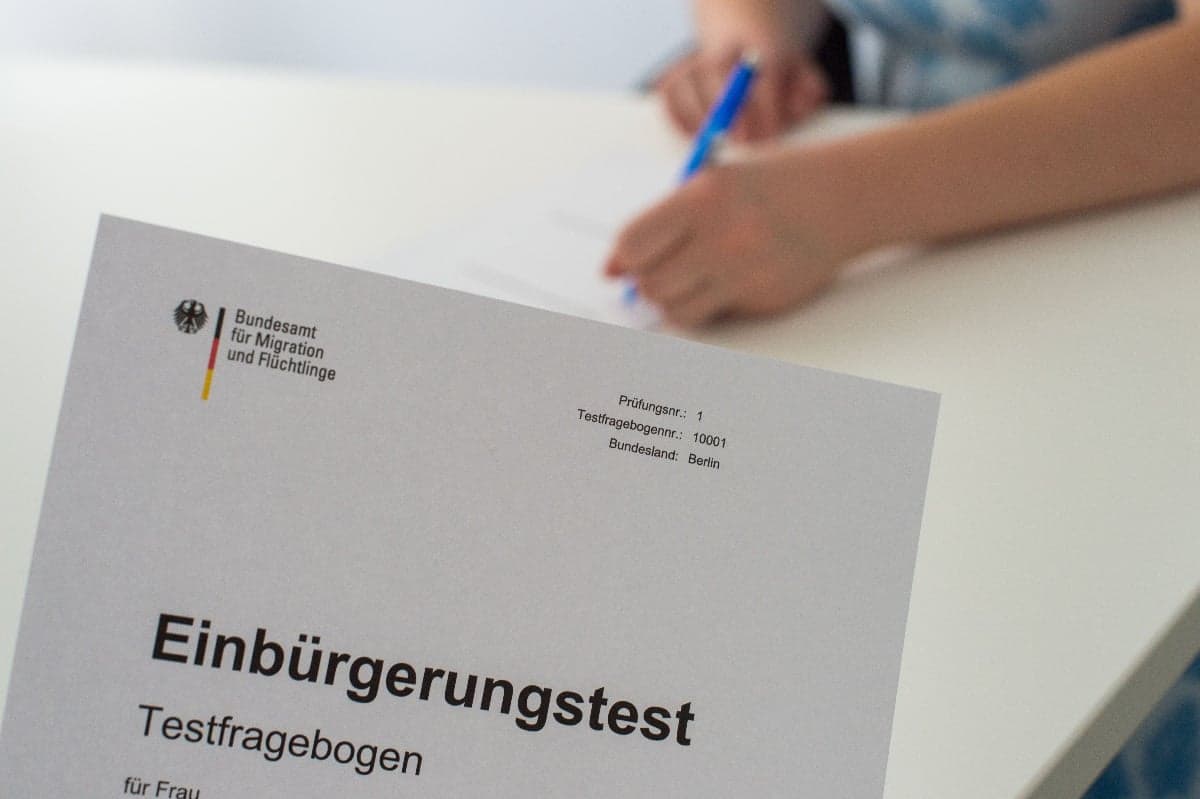The changes to Germany's immigration and citizenship rules in June 2024

With sweeping reforms to immigration and citizenship laws coming into force in June, we round up key points you need to know about.
Immigration law changes - Opportunity Card arrives
2024 is a major year for immigration law changes in Germany.
In November 2023, the government brought in the first phase of its new skilled worker law, with lower salary thresholds for Blue Card applicants and more flexibility for skilled workers to work in a range of professions.
In March 2024, Germany brought in more big changes to immigration rules, including quicker routes to permanent residence, amendments to make it easier for healthcare workers from outside the EU to move to Germany and relaxed family reunification rules. This was a controversial move because the new family rules only apply to workers coming to Germany after March and not those already here.
READ ALSO: INTERVIEW - 'Germany's family reunion rules should be non-discriminatory'
In June 2024, another big change arrives. Germany is launching the 'opportunity card' visa, known as the Chancenkarte.
This is a 'jobseekers' visa' allowing eligible skilled workers from outside the EU to move to Germany for up to a year to look for a job. They are also able to work up to 20 hours a week while they do so.
READ ALSO: How Germany's opportunity card will allow easier entries for foreign workers from June
The general idea is that people must have completed at least two years of vocational training, or have a university degree from their country of origin relevant to the vocation, as well as language skills in German or English.
Applicants whose qualifications aren't officially recognised in Germany can still apply for the opportunity card if they achieve at least six points, which are granted for things like language skills, connections to Germany, professional experience and age.
Potential applicants can find out more information and apply for the Opportunity Card at the German Consulate in their origin country, or at an immigration office (Ausländerbehörde) in Germany.
Those interested can also do a quick check to see if they qualify on this website.

A flight near Frankfurt airport. People looking to come to Germany can apply for the Chancenkarte. Photo: picture alliance/dpa | Boris Roessler
Extension of West Balkans regulation
Another big change in June applies to the so-called West Balkans regulation. Under a clause that was meant to expire in 2023, people from the West Balkan countries of Albania, Bosnia and Herzegovina, Kosovo, Montenegro, North Macedonia, and Serbia are able to enter the German job market in any non-regulated profession.
In June, this will be extended indefinitely, with a quota of 50,000 employment visas per year.
Germany's new citizenship law comes into force - June 27th
The modernisation of German citizenship law enters into force on June 27th - a moment foreign residents in Germany have been waiting years for.
Here are the key points you need to know at a glance:
Required residency period reduced
The amount of time you need to have lived in Germany to apply for the standard route to naturalisation in Germany will be reduced from eight years to five years under the law change.
In case of special integration achievements and proof of fluent German (C1 level), applicants can choose the fast-track option to German citizenship which will require just three years of legal residence in Germany. The fast-track option is currently six years and requires B2 level German skills.
READ ALSO: Requirements, costs and permits - 6 essential articles for German citizenship
Language skills and citizenship tests
Having B1 level German remains the requirement for citizenship through the standard route. As previously mentioned, a level of C1 German will be needed for the fast-track route.
Another change under the new law is that applicants who came to former West Germany from the so-called 'guest worker generation' and contract workers who came to former East Germany will not have to take a language test to naturalise as German. The same is true for certain hardship cases, such as having a disability or age.
READ ALSO: How good does your German have to be for the different paths to citizenship?
For those affected, no specific language requirement exists - but applicants must be able to communicate sufficiently with their case workers, unaided by a translator.
In general, doing a German citizenship test will still be required under the new rules -- but certain people in the carve-out situations mentioned above are exempt from taking it.
READ ALSO: How can over-60s get German citizenship under the new dual nationality law?

A German dictionary. Photo: picture alliance/dpa | Oliver Berg
Dual citizenship allowed for all
A headline change under the reforms is that people won't have to give up their passport to become German. Dual or multiple nationalities will be allowed for all. Previously, only EU nationals were allowed to hold more than one citizenship when becoming German, or under certain exceptions.
However, it's worth noting that the rules of people's origin country will need to be taken into account. For instance, if your home country does not allow people to hold dual nationalities, you may need to give up your passport. One example of this is Indian law, which does not allow for dual or multiple citizenships.
Similarly, German citizens who live abroad won't have to give up their German nationality if they want to naturalise in the country they live in -- provided their new home allows it.
Financial requirements
The principle from the current law remains -- anyone who wants to naturalise in German must be able to support themselves.
However, there are no clear rules on how much money someone needs to have or earn. This is assessed on a case-by-case basis and depends on several factors - for example - if you have dependents such as children or a spouse.
Having to rely too much on the welfare state will be an obstacle to getting citizenship, although it depends on the type of benefit and people's individual situation.
READ ALSO: How much do you need to earn to qualify for German citizenship?
Comments
See Also
Immigration law changes - Opportunity Card arrives
2024 is a major year for immigration law changes in Germany.
In November 2023, the government brought in the first phase of its new skilled worker law, with lower salary thresholds for Blue Card applicants and more flexibility for skilled workers to work in a range of professions.
In March 2024, Germany brought in more big changes to immigration rules, including quicker routes to permanent residence, amendments to make it easier for healthcare workers from outside the EU to move to Germany and relaxed family reunification rules. This was a controversial move because the new family rules only apply to workers coming to Germany after March and not those already here.
READ ALSO: INTERVIEW - 'Germany's family reunion rules should be non-discriminatory'
In June 2024, another big change arrives. Germany is launching the 'opportunity card' visa, known as the Chancenkarte.
This is a 'jobseekers' visa' allowing eligible skilled workers from outside the EU to move to Germany for up to a year to look for a job. They are also able to work up to 20 hours a week while they do so.
READ ALSO: How Germany's opportunity card will allow easier entries for foreign workers from June
The general idea is that people must have completed at least two years of vocational training, or have a university degree from their country of origin relevant to the vocation, as well as language skills in German or English.
Applicants whose qualifications aren't officially recognised in Germany can still apply for the opportunity card if they achieve at least six points, which are granted for things like language skills, connections to Germany, professional experience and age.
Potential applicants can find out more information and apply for the Opportunity Card at the German Consulate in their origin country, or at an immigration office (Ausländerbehörde) in Germany.
Those interested can also do a quick check to see if they qualify on this website.

Extension of West Balkans regulation
Another big change in June applies to the so-called West Balkans regulation. Under a clause that was meant to expire in 2023, people from the West Balkan countries of Albania, Bosnia and Herzegovina, Kosovo, Montenegro, North Macedonia, and Serbia are able to enter the German job market in any non-regulated profession.
In June, this will be extended indefinitely, with a quota of 50,000 employment visas per year.
Germany's new citizenship law comes into force - June 27th
The modernisation of German citizenship law enters into force on June 27th - a moment foreign residents in Germany have been waiting years for.
Here are the key points you need to know at a glance:
Required residency period reduced
The amount of time you need to have lived in Germany to apply for the standard route to naturalisation in Germany will be reduced from eight years to five years under the law change.
In case of special integration achievements and proof of fluent German (C1 level), applicants can choose the fast-track option to German citizenship which will require just three years of legal residence in Germany. The fast-track option is currently six years and requires B2 level German skills.
READ ALSO: Requirements, costs and permits - 6 essential articles for German citizenship
Language skills and citizenship tests
Having B1 level German remains the requirement for citizenship through the standard route. As previously mentioned, a level of C1 German will be needed for the fast-track route.
Another change under the new law is that applicants who came to former West Germany from the so-called 'guest worker generation' and contract workers who came to former East Germany will not have to take a language test to naturalise as German. The same is true for certain hardship cases, such as having a disability or age.
READ ALSO: How good does your German have to be for the different paths to citizenship?
For those affected, no specific language requirement exists - but applicants must be able to communicate sufficiently with their case workers, unaided by a translator.
In general, doing a German citizenship test will still be required under the new rules -- but certain people in the carve-out situations mentioned above are exempt from taking it.
READ ALSO: How can over-60s get German citizenship under the new dual nationality law?

Dual citizenship allowed for all
A headline change under the reforms is that people won't have to give up their passport to become German. Dual or multiple nationalities will be allowed for all. Previously, only EU nationals were allowed to hold more than one citizenship when becoming German, or under certain exceptions.
However, it's worth noting that the rules of people's origin country will need to be taken into account. For instance, if your home country does not allow people to hold dual nationalities, you may need to give up your passport. One example of this is Indian law, which does not allow for dual or multiple citizenships.
Similarly, German citizens who live abroad won't have to give up their German nationality if they want to naturalise in the country they live in -- provided their new home allows it.
Financial requirements
The principle from the current law remains -- anyone who wants to naturalise in German must be able to support themselves.
However, there are no clear rules on how much money someone needs to have or earn. This is assessed on a case-by-case basis and depends on several factors - for example - if you have dependents such as children or a spouse.
Having to rely too much on the welfare state will be an obstacle to getting citizenship, although it depends on the type of benefit and people's individual situation.
READ ALSO: How much do you need to earn to qualify for German citizenship?
Join the conversation in our comments section below. Share your own views and experience and if you have a question or suggestion for our journalists then email us at [email protected].
Please keep comments civil, constructive and on topic – and make sure to read our terms of use before getting involved.
Please log in here to leave a comment.